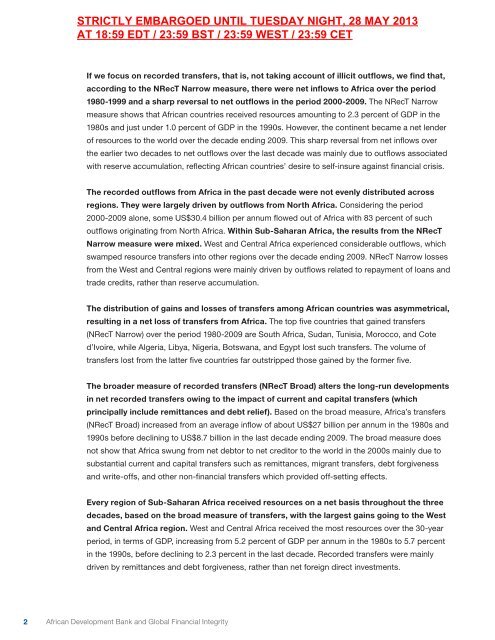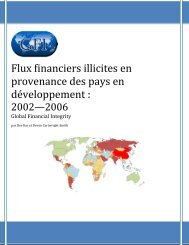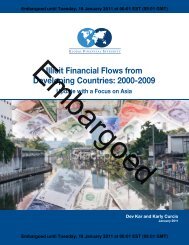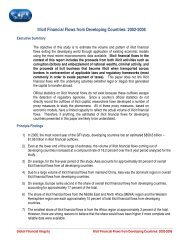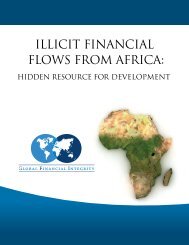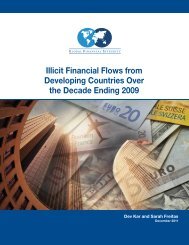Illicit Financial Flows
Illicit Financial Flows and the Problem of Net Resource Transfers ...
Illicit Financial Flows and the Problem of Net Resource Transfers ...
You also want an ePaper? Increase the reach of your titles
YUMPU automatically turns print PDFs into web optimized ePapers that Google loves.
STRICTLY EMBARGOED UNTIL TUESDAY NIGHT, 28 MAY 2013<br />
AT 18:59 EDT / 23:59 BST / 23:59 WEST / 23:59 CET<br />
If we focus on recorded transfers, that is, not taking account of illicit outflows, we find that,<br />
according to the NRecT Narrow measure, there were net inflows to Africa over the period<br />
1980-1999 and a sharp reversal to net outflows in the period 2000-2009. The NRecT Narrow<br />
measure shows that African countries received resources amounting to 2.3 percent of GDP in the<br />
1980s and just under 1.0 percent of GDP in the 1990s. However, the continent became a net lender<br />
of resources to the world over the decade ending 2009. This sharp reversal from net inflows over<br />
the earlier two decades to net outflows over the last decade was mainly due to outflows associated<br />
with reserve accumulation, reflecting African countries’ desire to self-insure against financial crisis.<br />
The recorded outflows from Africa in the past decade were not evenly distributed across<br />
regions. They were largely driven by outflows from North Africa. Considering the period<br />
2000-2009 alone, some US$30.4 billion per annum flowed out of Africa with 83 percent of such<br />
outflows originating from North Africa. Within Sub-Saharan Africa, the results from the NRecT<br />
Narrow measure were mixed. West and Central Africa experienced considerable outflows, which<br />
swamped resource transfers into other regions over the decade ending 2009. NRecT Narrow losses<br />
from the West and Central regions were mainly driven by outflows related to repayment of loans and<br />
trade credits, rather than reserve accumulation.<br />
The distribution of gains and losses of transfers among African countries was asymmetrical,<br />
resulting in a net loss of transfers from Africa. The top five countries that gained transfers<br />
(NRecT Narrow) over the period 1980-2009 are South Africa, Sudan, Tunisia, Morocco, and Cote<br />
d’Ivoire, while Algeria, Libya, Nigeria, Botswana, and Egypt lost such transfers. The volume of<br />
transfers lost from the latter five countries far outstripped those gained by the former five.<br />
The broader measure of recorded transfers (NRecT Broad) alters the long-run developments<br />
in net recorded transfers owing to the impact of current and capital transfers (which<br />
principally include remittances and debt relief). Based on the broad measure, Africa’s transfers<br />
(NRecT Broad) increased from an average inflow of about US$27 billion per annum in the 1980s and<br />
1990s before declining to US$8.7 billion in the last decade ending 2009. The broad measure does<br />
not show that Africa swung from net debtor to net creditor to the world in the 2000s mainly due to<br />
substantial current and capital transfers such as remittances, migrant transfers, debt forgiveness<br />
and write-offs, and other non-financial transfers which provided off-setting effects.<br />
Every region of Sub-Saharan Africa received resources on a net basis throughout the three<br />
decades, based on the broad measure of transfers, with the largest gains going to the West<br />
and Central Africa region. West and Central Africa received the most resources over the 30-year<br />
period, in terms of GDP, increasing from 5.2 percent of GDP per annum in the 1980s to 5.7 percent<br />
in the 1990s, before declining to 2.3 percent in the last decade. Recorded transfers were mainly<br />
driven by remittances and debt forgiveness, rather than net foreign direct investments.<br />
2 African Development Bank and Global <strong>Financial</strong> Integrity


